What's Happening?
Kosmos, an AI system developed by Edison Scientific, claims to significantly accelerate scientific research by processing large datasets and analyzing existing literature. The system operates through a collection
of AI agents that can independently conduct research equivalent to six months of human effort in just a few hours. Kosmos performs tasks such as searching through academic papers, writing code, and generating research summaries. The system has reportedly made several novel scientific contributions, including discoveries related to Alzheimer's disease and heart health. However, some experts have expressed skepticism about the validity of these claims, citing methodological flaws and questioning the novelty of certain findings.
Why It's Important?
The development of Kosmos highlights the potential for AI to transform scientific research by reducing the time and resources required for data analysis. This could lead to faster scientific breakthroughs and more efficient research processes. However, the skepticism from some experts underscores the need for careful validation and scrutiny of AI-generated findings. The system's ability to produce accurate results is crucial for its acceptance in the scientific community. If successful, Kosmos could benefit industries reliant on rapid data analysis, such as pharmaceuticals and biotechnology, by accelerating the discovery of new treatments and technologies.
What's Next?
As Kosmos continues to evolve, its creators aim to refine its capabilities and address criticisms regarding its accuracy and methodology. The system is expected to be used as a collaborative tool rather than a replacement for human researchers, emphasizing the importance of human oversight in validating AI-generated conclusions. Future developments may focus on improving the system's ability to make novel scientific claims and enhancing its reliability. The ongoing dialogue between Kosmos' developers and the scientific community will likely shape the system's future applications and acceptance.
Beyond the Headlines
The emergence of AI systems like Kosmos raises ethical and philosophical questions about the role of AI in scientific discovery. While AI can process data at unprecedented speeds, the creative and critical thinking aspects of research remain essential. The balance between automated data analysis and human insight will be crucial in ensuring that scientific advancements are both innovative and reliable. Additionally, the integration of AI in research may influence educational approaches, emphasizing the need for scientists to develop skills in AI collaboration.












